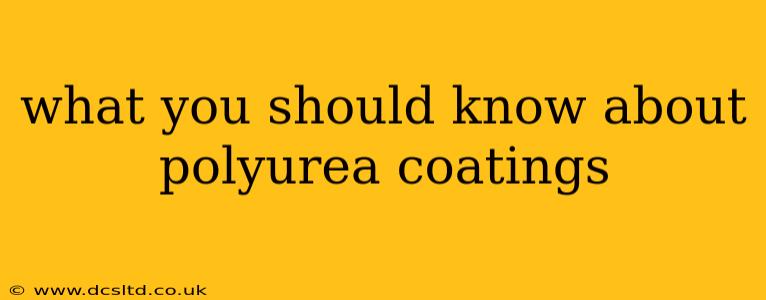Polyurea coatings are rapidly gaining popularity across various industries for their exceptional properties and versatility. But what exactly are they, and why are they becoming so widely used? This comprehensive guide delves into the key aspects of polyurea coatings, addressing common questions and highlighting their unique advantages.
What is Polyurea?
Polyurea is a type of spray-applied elastomer formed by the rapid reaction of an isocyanate component and an amine component. This reaction, known as chain extension, creates a tough, flexible, and durable coating that cures almost instantly. Unlike many other coatings that require significant drying time, polyurea cures in seconds, allowing for rapid project completion. This speed is a significant advantage in many applications. The chemical reaction produces a seamless, monolithic membrane with exceptional strength and resilience.
What are the Advantages of Polyurea Coatings?
Polyurea coatings offer a compelling combination of benefits, making them a superior choice for numerous applications:
-
Exceptional Durability: Polyurea's exceptional tensile strength, elongation, and tear resistance mean it can withstand extreme conditions, including impact, abrasion, and UV exposure. This makes it ideal for long-term protection in demanding environments.
-
Rapid Curing Time: The near-instantaneous curing drastically reduces downtime, accelerating project completion and minimizing disruption.
-
Seamless Application: The spray application creates a continuous, seamless membrane, eliminating weak points and vulnerabilities common in other coating systems.
-
Excellent Chemical Resistance: Polyurea resists a wide range of chemicals, solvents, and corrosive substances, making it ideal for protecting surfaces exposed to harsh environments.
-
Waterproof and Moisture Resistant: Its impermeable nature makes it an excellent barrier against water, moisture, and humidity, preventing damage and deterioration.
-
UV Resistance: Unlike some coatings that degrade under prolonged sun exposure, polyurea maintains its integrity and performance even under intense UV radiation.
What are the Different Types of Polyurea Coatings?
While the core chemistry remains consistent, polyurea coatings can be categorized based on their specific formulation and properties:
-
100% Polyurea: This offers the highest level of durability and performance but can be more expensive.
-
Polyurea Hybrids: These blends incorporate other polymers to modify properties like flexibility, cost, or viscosity. These offer a balance between performance and cost-effectiveness.
-
Alloyed Polyureas: These specialized formulations incorporate specific additives to enhance certain characteristics, such as abrasion resistance or UV protection.
What are the Common Applications of Polyurea Coatings?
Polyurea's versatility extends across numerous industries:
-
Protective Coatings: Protecting infrastructure like bridges, pipelines, and containment structures from corrosion and environmental degradation.
-
Industrial Flooring: Creating durable, chemical-resistant floors in factories, warehouses, and processing plants.
-
Waterproofing: Sealing roofs, basements, and other structures to prevent water damage.
-
Automotive and Marine Applications: Protecting vehicles and boats from rust, corrosion, and impact damage.
-
Insulation: Used in spray foam insulation systems to enhance energy efficiency.
How Long Do Polyurea Coatings Last?
The lifespan of a polyurea coating varies significantly depending on the application, environmental conditions, and the quality of the installation. However, with proper application and under normal conditions, polyurea coatings can last for decades, offering a long-term, cost-effective solution.
How Much Does Polyurea Coating Cost?
The cost of polyurea coating varies widely depending on several factors, including project size, surface preparation, application complexity, and the specific type of polyurea used. It's crucial to obtain quotes from multiple reputable contractors to compare pricing and ensure you receive competitive rates.
Is Polyurea Coating Safe?
While generally safe when applied correctly by trained professionals, polyurea coatings require careful handling due to the isocyanates involved in their creation. Proper safety precautions, including respiratory protection and appropriate ventilation, are essential during application. Always engage certified applicators who adhere to strict safety protocols.
This information provides a comprehensive overview of polyurea coatings. Remember to consult with experienced professionals for specific advice related to your individual needs and project requirements. The versatility and long-term benefits of polyurea are making it a leading choice for diverse applications demanding superior protection and durability.
